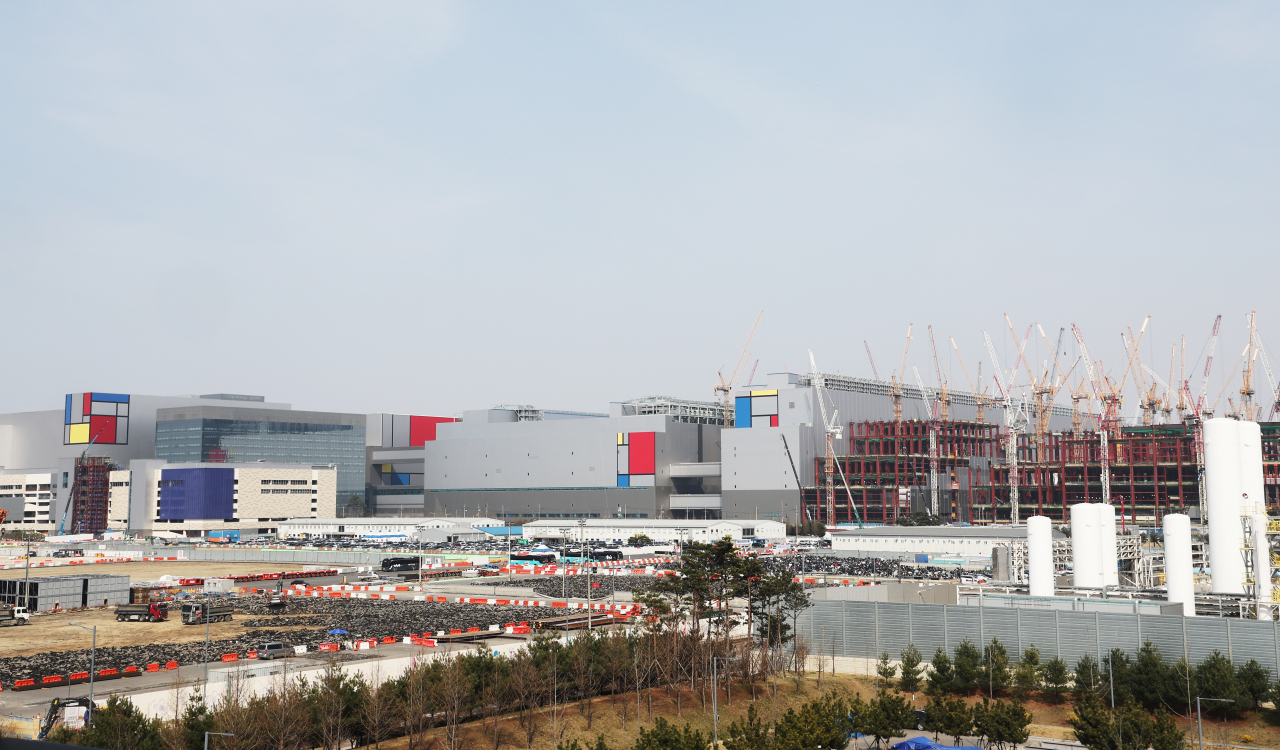Market Now
Korean chips act aims to extend tax cuts for local chipmakers
 |
A Samsung Electronics semiconductor manufacturing plant under construction in Pyeongtaek, Gyeonggi Province, Thursday. (Yonhap) |
South Korea on Thursday passed a revision bill deemed the “Korean chips act” with greater tax breaks for investments in the semiconductor industry to lighten the burden for Korean chipmakers competing in the global chips arms race.
The National Assembly passed a revision bill to the Restriction of Special Taxation Act, which raises the corporate tax break for facility investment in the semiconductor and other strategic industries to 15 percent for large corporations such as Samsung Electronics and SK hynix, from the previous 8 percent.
The tax deduction rate for small- and mid-sized enterprises also rose to 25 percent from 16 percent, following the passage.
Among the 231 lawmakers present, 179 voted to approve the revision, while 13 opposed and 39 abstained.
With the latest amendment including a new provision offering an additional 10 percent tax deduction on the increments in investment, conglomerates and companies could receive a tax cut of 25 percent at maximum.
The revision proposal raising the tax break rate came in about four months after the previous bill passed in December came short of industry expectations. While the industry anticipated a deduction of some 20 percent, the amendment that passed at the time offered an 8 percent cut.
Amid rising calls for another increase, President Yoon Suk Yeol had instructed the Finance Ministry to come up with greater tax cuts for the semiconductor and other strategic industries.
The latest revision is anticipated to help the local chip industry save some trillions of won, especially for Samsung and SK hynix, the world's top two memory chipmakers, which have announced plans to launch large production facilities in Korea.
According to the Korea Economic Research Institute, South Korea's top 10 chipmakers would save up to 360 billion won ($277 million) if the tax deduction rate is increased by 1 percentage point.
Under the calculation, the latest revision raising the tax deduction rate from 8 percent to 15 percent would save some 2.5 trillion won for the local chip industry, KERI estimated.
Samsung recently announced that it would put some 300 trillion won toward building a massive chip cluster with five advanced chip manufacturing plants in Yongin, Gyeonggi Province by 2042. SK hynix is also currently working to establish a semiconductor cluster in the same city, investing some 120 trillion won.
Amid the ongoing downturn in the semiconductor industry, the business sentiment in the manufacturing sector recovered in March.
According to the Bank of Korea, the Business Survey Index on business conditions in the manufacturing sector rebounded in the month to record 70, up 7 percentage points from the previous month.
The BSI is calculated based on the survey on entrepreneurs’ perceptions and outlook for the month and the following month, and the figure goes below 100 when negative responses outnumber positive ones.
The BSI for the manufacturing sector had been on decline consecutively for the past three month from December last year. In February, the score marked 63, the lowest after the figure stood at 59 in July 2020.
Meanwhile, South Korean Minister for Trade Ahn Duk-geun met with US Trade Representative Katherine Tai on Thursday to discuss the series of pending issues regarding the US Chips Act and the regional economic initiatives.
Meeting the US trade representative in Seoul, Ahn relayed concerns the government and South Korean chip makers have over the US’ strict requirement and the guardrail provision for its chips subsidy program, South Korea's Finance Ministry said. Ahn also suggested the two sides expand cooperation in the semiconductor industry.
The US announced a $52 billion semiconductor funding program requiring the applicants to share sensitive business information and excess profits with the US government.
With the program largely aimed at keeping China in check, the guardrail provision limiting fund recipients from expanding production in China has also prompted concerns for Korean chipmakers who run production facilities in China.
By Jo He-rim (herim@heraldcorp.com)


![[Global Finance Awards] Mirae Asset Securities' global top-tier ambition within reach](http://res.heraldm.com/phpwas/restmb_idxmake.php?idx=151&simg=/content/image/2024/11/27/20241127050077_0.jpg)
![[Global Finance Awards] Kyobo Life enhances insurance coverage for cancer, long-term care](http://res.heraldm.com/phpwas/restmb_idxmake.php?idx=151&simg=/content/image/2024/11/26/20241126050106_0.jpg)
![[Global Finance Awards] Kakao Bank bolsters SE Asia foray with Superbank partnership](http://res.heraldm.com/phpwas/restmb_idxmake.php?idx=151&simg=/content/image/2024/11/27/20241127050076_0.jpg)
![[Global Finance Awards] IBK boosts support for small businesses](http://res.heraldm.com/phpwas/restmb_idxmake.php?idx=151&simg=/content/image/2024/11/27/20241127050072_0.jpg)
![[Global Finance Awards] Shinhan chief pushes to boost corporate value](http://res.heraldm.com/phpwas/restmb_idxmake.php?idx=151&simg=/content/image/2024/11/27/20241127050074_0.jpg)
![[Global Finance Awards] Mirae Asset bolsters global presence with W370tr under management](http://res.heraldm.com/phpwas/restmb_idxmake.php?idx=151&simg=/content/image/2024/11/27/20241127050075_0.jpg)
